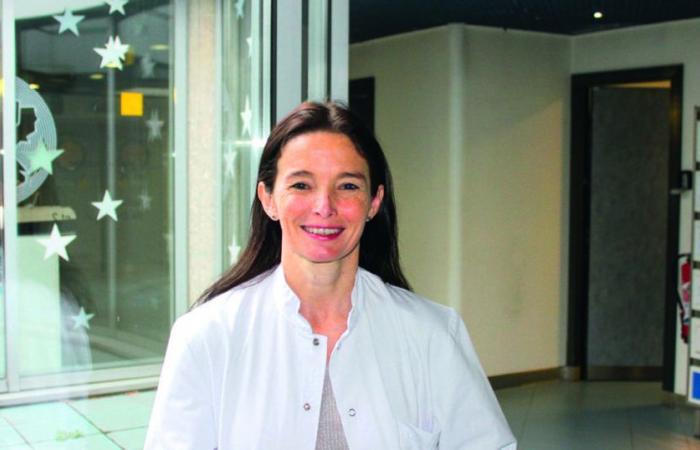INTERVIEW – Screening via a simple test is an effective weapon in the face of the increase in cases. It still needs to be promoted more.
LE FIGARO HEALTH. – THE cancer colorectal threatens our societies: its incidence is expected to rise sharply by 2030 in Western countries. What are the reasons? ?
ANNE CATTEY-JAVOUHEY. – With the forecast of an increase of more than 70% in the number of new cases of colorectal cancer in the United States within six years, this cancer will experience a real explosion, particularly among increasingly younger people, mainly explained by Western lifestyles generating risk factors. Some of these factors are avoidable: this is why prevention is at the heart of this public health issue.
What kind of tumor are we talking about when we talk about the colon and rectum? ?
Colorectal cancer develops in an individual’s intestine from a polyp, a precancerous lesion that degenerates. In 20% of cases, this cancer occurs in a familial context (family history), genetics, or follows rare hereditary diseases of the colon. For the rest, i.e. 80% of cases, its appearance is explained by other factors linked to lifestyle and the environment and in particular diet and physical activity.
For these lifestyle cancers, what advice to reduce the risk ?
First of all, it is important to change your diet: it is now clearly established that what we eat has an impact on our health. For example, the risk of developing cancer in people who have changed their diet because they have migrated to a new country is closer to that of residents of that country. The best diet for good colorectal health will be rich in fruits and vegetables, legumes, fish and seafood. On the contrary, certain foods should be avoided or severely limited: red meats and cold meats, alcohol and sugary drinks, fatty and sugary foods, as well as all ultra-processed products from the food industry.
Also read
Colorectal cancer: will a blood test change screening?
Physical activity is also beneficial…
It is now established that regular physical activity is a protective factor against colorectal cancer. Current recommendations are to achieve at least thirty minutes of moderate-to-vigorous intensity physical activity at least five days a week. These activities can be included as part of active work, leisure time or even to get around in daily life (walking, cycling, etc.). Moving and eating well are what protect against colorectal cancer, but also against many other diseases: changing your behavior is thus beneficial to your health in general.
In France, this screening targets all people aged 50 to 74
If we can change our lifestyle to protect ourselves, we above all have the possibility of avoiding the occurrence of colorectal cancer through prevention. How is it organized in France ?
Two levers must be considered: primary prevention to avoid the formation of polyps which will turn into cancer – this involves the promotion of a better lifestyle discussed previously – and so-called secondary prevention with the carrying out of screening for detect a tumor early. In France, this screening targets all people aged 50 to 74. The procedures are very simple: these people receive an invitation by post to order a free FIT test (test for blood in stools) on the internet, or obtain it directly from the pharmacy, or from their general practitioner.
This test can be carried out quickly and easily at home (without touching the stools) using a suitable device. This test must then be returned by post. If the result is positive, you should then consult a gastroenterologist and perform a colonoscopy. During this procedure, polyps are found in 40% of cases and are removed immediately. In 4% of cases, a tumor is detected early, which allows treatment to be quickly implemented with a high cure rate.
Also read
Lung cancer screening: is France delaying too much?
And for people at higher risk due to family history ?
People at high risk – with a family history, namely colorectal polyps or cancers in family members (parents or grandparents regardless of age) – should consult to schedule a colonoscopy directly, without the step of the home test, usually from the age of 45.
People without a family history, but with symptoms (weight loss, abdominal pain, blood in the stools or transit problems, etc.) or with colon disease (Crohn’s disease, ulcerative colitis) are also considered to be at greater risk and will benefit from ‘a colonoscopy as well. Depending on the number and size of the polyps revealed by the colonoscopy, a check-up will be scheduled every three or five years.
Given the increase in the number of new cases among young people, will the secondary prevention strategy evolve? ?
It would be relevant, in fact, to carry out screening in people under 50 with risk factors (overweight, sedentary lifestyle, etc.), but also in individuals over 75: today, elderly people in very good general condition can benefit from our screening and treatment strategies. It should be noted that a colonoscopy makes it possible to remove, using an endoscope, polyps before they become cancerous and, with the use of a new technique called “submucosal dissection”, to resect superficial cancers. If the disease is more advanced locally, surgery is proposed, and depending on the case, after analysis of the tumor, chemotherapy can be added. If the disease has already progressed (metastatic stage) chemotherapy will be offered.
Also read
Breast cancer, colorectal cancer: the French are far behind in screening
Colorectal cancer affects nearly 47,000 new people in France each year. Does this mean that there are still efforts to be made to detect it? ?
Indeed, for its benefit to be significant for public health, it is necessary that the screening test be carried out by as many people as possible. However, participation varies greatly depending on the region, it is notably greater in the north than in the south of France. The ideal would be to reach a participation rate of 50%, but we are not there yet…
To increase support, we should communicate more about this cancer, strengthen screening resources
To increase support, we should communicate more about this cancer, strengthen screening resources, particularly regarding promotional actions, popularize the Blue Mars awareness month like Pink October for breast cancer, etc. . In the Lyon region, at the Léon-Bérard center, many innovative projects are being developed, including the construction of a cancer prevention center intended for the general public in a dedicated building, with specialists available and the ambition to raise awareness as widely as possible. It is due to open in 2025.






